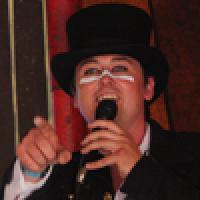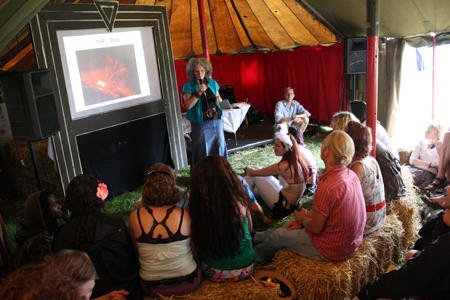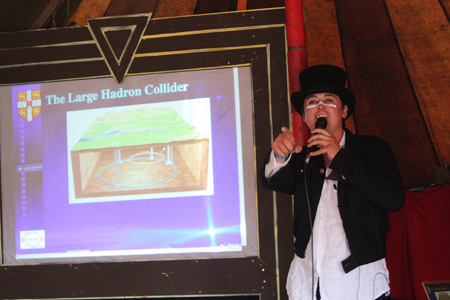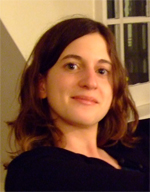
Guerilla maths

Solar physicist Helen Mason talking at the Secret Garden Party.
Particle physics isn't what you expect to find at music festivals, but this year visitors to the Secret Garden Party were treated to just that — and more — thanks to Guerilla Science, an initiative committed to bringing science to music festivals. An unusual mission, perhaps, but the talks, chats and hands-on sessions managed to pack out the tents.
The mathematically-based sciences were well represented, mostly by members of the Department of Applied Mathematics and Theoretical Physics (DAMTP) at the University of Cambridge (which is also the home of Plus). Chris Taylor, a PhD student at DAMTP in nonlinear dynamics, talked on crowd dynamics, explaining how simple, local rules applied to individuals are enough to explain the behaviour of a crowd of people, the synchronised flight of a flock of starlings or the complicated patterns of bacterial colonies.
Solar physicist and Plus author Helen Mason impressed with beautiful images of the Sun, explaining how solar flares and variations in the solar cycle can affect the temperature on Earth. These effects are not to blame for the recent increase in global warming. On the contrary, understanding the Sun's mechanism of energy production is important in the development of fusion power, a clean source of energy. Theoretical physicist Ben Allanach, who told us about particle hunting at the LHC in the current issue of Plus, explored current models of the Universe and particle physics in his talk on the origin of symmetry. Using a guitar to show how different elementary particles can be thought of as different vibrations modes of the same string, Allanach explained the basics of string theory.

Particle physicist Ben Allanach talking at the Secret Garden Party.
Guerilla Science is now in its second year, and this summer also visited the Latitude festival. Besides mathematics and physics, the activities also explored neuroscience and the science of music. These kind of outreach activities are beneficial not just for the audience, but also for scientists themselves. For graduate students they provide an opportunity to improve communication skills, which are increasingly expected from budding scientists in the UK. For the science community as a whole it's a chance to debunk stereotypes surrounding scientists and mathematicians, while contributing to the improvement of scientific literacy of the general public. Mark Rosin, a PhD student in astrophysical fluid dynamics at DAMTP and one of the organisers of the Guerilla Science tent at the festivals, has recently won a grant from the Science and Technology Facilities Council to support Guerilla Science. And the response both at Latitude and the Secret Garden Party proves how successful such initiatives can be.
About the author

Barbara Ferreira
Barbara Ferreira is a final year PhD student in astrophysical fluid dynamics at DAMTP. She's originally from Portugal and studied physics and applied maths at the University of Porto before coming to Cambridge. She went along to the Secret Garden Party and wrote this article together with the Plus team.
Helen Mason also produces Sun|trek, a website all about our star designed for school students and teachers.